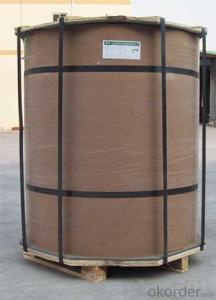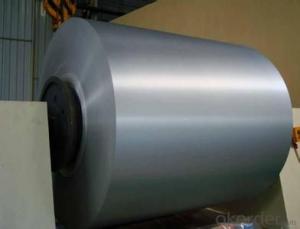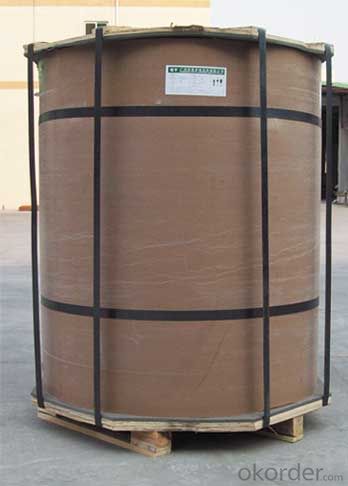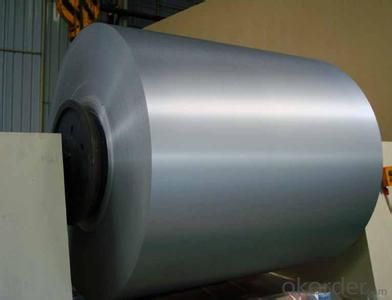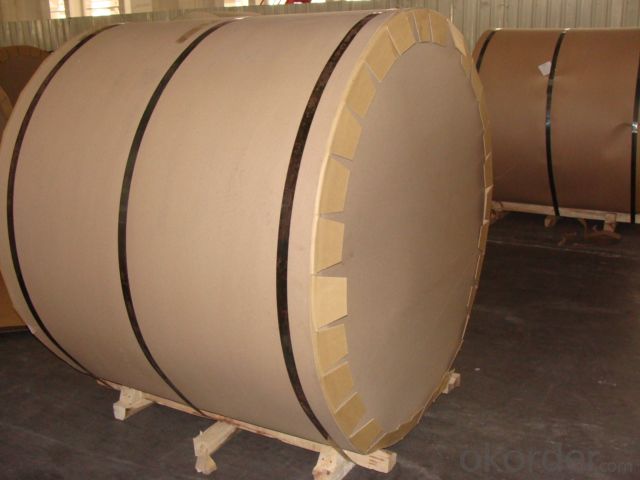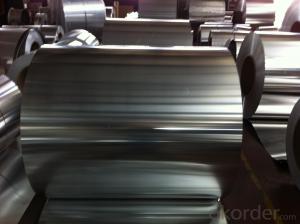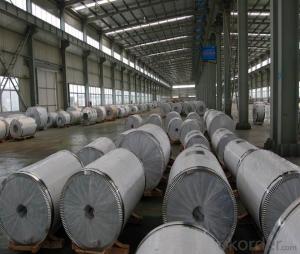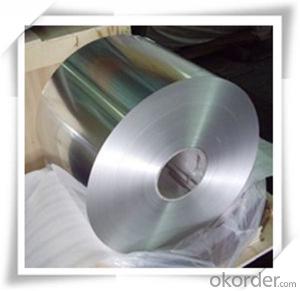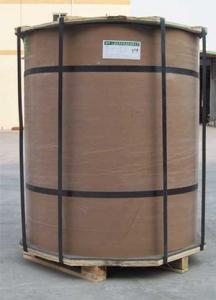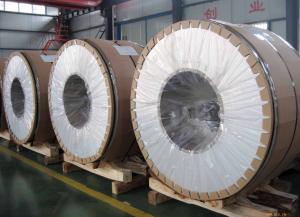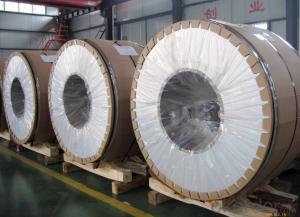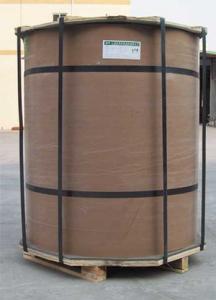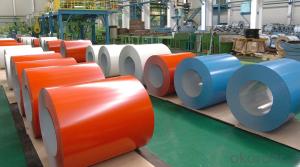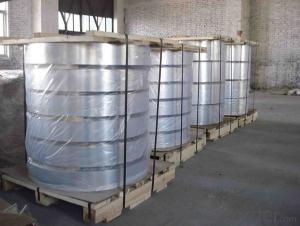032 Aluminum Coil - Mill-Finished Aluminum Coils 5xxx
- Loading Port:
- China Main Port
- Payment Terms:
- TT OR LC
- Min Order Qty:
- -
- Supply Capability:
- -
OKorder Service Pledge
OKorder Financial Service
You Might Also Like
Specifications
Aluminum Coil
1.Manfacture
2.Woodenbox package
3.Material is from big aluminum factory
High Quality and Factory Price Aluminum Coil
Specifications
Grade
| 1000 Series: 1050 1060 1070 1100 1200 1235 etc. 3000 Series: 3003 3004 3005 3104 3105 3A21 etc. 5000 Series: 5005 5052 5083 5086 5154 5182 5251 5754 etc. 6000 Series: 6061 6063 6082 6A02 etc. 8000 Series: 8006 8011 8079 etc. |
Thickness | 0.05~10mm |
Width | <1600mm |
Color | Metallic, Solid, RAL or by customer requirements |
Coating paint: | PVDF(Polyvinylidene Fluoride), PE(Polyester ) |
Coating thickness | as per customer’s request |
Gloss | 10-90%(EN ISO-2813:1994) |
Total coating thick | Polyester18~27micron(EN ISO-2360:1995) PVDF27 ~35micron(EN ISO-2360:1995) |
Coating hardness | 2H |
Protective film | PVC film, Colorless transparent or White-black |
Adhesion | 5B (EN ISO-2409:1994) |
Impact resistance | No cracking and peeling (A.S.T.M D2794-1993) |
Flexibility (T-bend) | 0T- 2T |
Temper | H16, H18, H24, H26, H26 |
Certification | ISO9001:2000, CE, SGS |
Coil's standard diameter | 1100mm |
Inner Diameter | 405mm/505mm |
Coil's standard weight | 2000kgs |
Payment | L/C ,T/T |
- Q: How to sell the super hard 5083aluminum alloy and 5083 aluminum coil?
- Among the alloy which cannot endure heat treatment, 5083 aluminum alloy, a kind of high magnesium alloy, has the properties of intensity, machinability, anti-corrosion, electric-arc weldability and aesthetic after anodizing. The main element of 5083 alloy being magnesium, it is endowed with corrosion resistance, weldablility and moderate intensity, thus applicable to maritime areas such as ships, and cars, airplane weldments, metro light rail, and pressure vessel (such as liquid tank truck, refrigerated truck, refrigerated container), refrigerating equipment, television tower, drilling equipment, transport facility, missile parts, armor and so on.
- Q: They say aluminum can be found in deodorants.And this aluminum is absorbed by the skin and block pores.Does the amount of aluminum affect the rate of how it dries up?
- Like any chemical reaction quantity would matter. Aluminum Chloride is one of several active ingredients. It works by doing two things. The first is it is an astrigent which causes the sweat glands to shrink or close up. The second is that it reacts with sweat to form a gell like substance that plugs up the pores. The combined effect is to stop sweating. The two effects are temporary and the pores eventually open up and clear themselves out. These two drying effects of aluminum chloride are fast acting and work upon application. So to answer your question i would consider aluminum as a means of making a deoderant dry faster by stopping the sweat from leaving the pores.
- Q: Are there any limitations or restrictions on the use of aluminum coils?
- Yes, there are limitations and restrictions on the use of aluminum coils. Some of the main limitations include: 1. Corrosion: Aluminum is prone to corrosion, especially when it comes into contact with certain chemicals or environments. Therefore, it may not be suitable for applications where it will be exposed to corrosive substances or in highly corrosive environments. 2. Strength: While aluminum is a lightweight material, it is not as strong as other metals like steel. This can limit its use in applications that require high strength or load-bearing capabilities. 3. Temperature sensitivity: Aluminum has a lower melting point compared to other metals, which can be a limitation in applications where high temperatures are involved. It may not be suitable for use in certain industrial or high-temperature environments. 4. Electrical conductivity: While aluminum has good electrical conductivity, it is not as conductive as copper. This can limit its use in applications where high electrical conductivity is required, such as in electrical wiring or power transmission. 5. Cost: Aluminum can be more expensive than other metals, limiting its use in applications where cost is a significant factor. In such cases, alternative materials may be preferred. 6. Formability: Aluminum coils can be difficult to form or shape compared to some other metals. This limitation may restrict their use in applications where complex shapes or tight tolerances are required. It is important to consider these limitations and restrictions when selecting aluminum coils for a particular application. Careful evaluation of the specific requirements and constraints will help determine whether aluminum coils are suitable or if alternative materials should be considered.
- Q: What are the common transportation methods for aluminum coils?
- The common transportation methods for aluminum coils include trucking, rail, and shipping. Trucking is often used for short distances or when there is a need for prompt delivery. Aluminum coils are typically loaded onto flatbed trailers or specialized coil trailers equipped with cradles or coil racks to secure them in place during transit. This method offers flexibility and allows for easy access to various locations. Rail transportation is commonly used for long-distance shipments. Aluminum coils are loaded onto railcars, which are specifically designed to accommodate the weight and dimensions of the coils. Rail transportation is advantageous for its cost-effectiveness and ability to transport large quantities of coils in a single shipment. Shipping by sea is another common method for transporting aluminum coils, especially for international shipments. Coils are typically loaded onto cargo ships in specialized containers or directly onto the ship's deck. Shipping offers the advantage of carrying large volumes of coils over long distances, and it is often the preferred method for global distribution due to its efficiency and cost-effectiveness. Overall, the transportation methods for aluminum coils depend on factors such as distance, urgency, quantity, and destination. Companies must consider these factors to determine the most suitable transportation method for their specific needs.
- Q: Can aluminum coils be used in telecommunications infrastructure?
- Yes, aluminum coils can be used in telecommunications infrastructure. Aluminum is commonly used in various components of telecommunications infrastructure, including cables, connectors, and antennas. It is preferred for its lightweight, durable, and corrosion-resistant properties, making it suitable for outdoor installations. Additionally, aluminum coils provide excellent conductivity, ensuring efficient transmission of signals in telecommunications systems.
- Q: How are aluminum coils used in solar panels?
- The role of aluminum coils in the manufacturing and functioning of solar panels is crucial. Solar panels convert sunlight into electricity, and aluminum coils are a key component in constructing the panel. To begin with, aluminum coils serve as the base material for the solar panel's frame. The frame provides structural support and stability to the panel, ensuring it can withstand different environmental conditions like wind, rain, and snow. Aluminum is preferred because it is lightweight, resistant to corrosion, and durable. Apart from the frame, aluminum coils are also used to create the panel's backsheet. The backsheet is a protective layer that covers the rear surface of the panel, shielding it from moisture, heat, and other external factors. Aluminum coils are often combined with other materials, such as polymers or glass, to form a strong and impermeable backsheet. In addition, aluminum is an excellent conductor of electricity. Solar panels consist of individual solar cells that generate direct current (DC) electricity when exposed to sunlight. Aluminum coils are used to establish the electrical connections between these cells, enabling the flow of electricity within the panel. Furthermore, aluminum coils are employed in manufacturing the panel's wiring and connectors. These components collect the generated electricity and transmit it to an inverter, which converts it into alternating current (AC) electricity suitable for use in homes and businesses. Aluminum's conductivity and low resistance make it an ideal material for efficiently transferring electrical energy. Overall, aluminum coils are crucial in the construction and functionality of solar panels. They provide structural support, form protective layers, enable electrical connections, and facilitate the efficient transmission of electricity. As the demand for renewable energy increases, the use of aluminum coils in solar panels continues to be vital in harnessing the power of the sun to generate clean and sustainable electricity.
- Q: Can aluminum coils be used in automotive body panels?
- Yes, aluminum coils can be used in automotive body panels. Aluminum is a lightweight and corrosion-resistant material, making it an ideal choice for automotive applications. The use of aluminum coils in body panels offers several advantages, including improved fuel efficiency due to the reduced weight of the vehicle, better handling and maneuverability, and enhanced durability. Additionally, aluminum is highly recyclable, making it an environmentally friendly option for automotive manufacturing. Many automakers have already started incorporating aluminum coils in their vehicles, and this trend is expected to continue as the industry strives for lighter and more sustainable vehicles.
- Q: How do I write ionic formula for Sodium Aluminum Silicate? Please explain in a easy way ,,,,,,,,,,,,
- www.okorder /
- Q: Can aluminum coils be used in roofing or cladding systems?
- Yes, aluminum coils can be used in roofing or cladding systems. Aluminum is a lightweight and corrosion-resistant material, making it suitable for these applications. It offers durability, flexibility, and ease of installation, making it a popular choice in the construction industry.
- Q: Can aluminum coils be used in the production of solar panels?
- Aluminum coils are indeed suitable for the production of solar panels. Being a lightweight and durable material, aluminum brings numerous advantages to the manufacturing process. Its high conductivity and exceptional thermal properties enable efficient dissipation of heat. Furthermore, aluminum exhibits resistance to corrosion, a vital characteristic for solar panels as they encounter diverse weather conditions. Moreover, the cost-effectiveness of aluminum makes it a favored option in the solar industry. By employing aluminum coils in solar panel production, the performance, durability, and cost-effectiveness of these panels are greatly improved.
Send your message to us
032 Aluminum Coil - Mill-Finished Aluminum Coils 5xxx
- Loading Port:
- China Main Port
- Payment Terms:
- TT OR LC
- Min Order Qty:
- -
- Supply Capability:
- -
OKorder Service Pledge
OKorder Financial Service
Similar products
Hot products
Hot Searches
Related keywords
